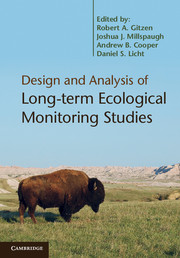Book contents
- Frontmatter
- Contents
- List of contributors
- Foreword: Ecology, management, and monitoring
- Preface
- Acknowledgments
- Abbreviations
- Section I Overview
- 1 Ecological monitoring
- 2 An overview of statistical considerations in long-term monitoring
- 3 Monitoring that matters
- 4 Maximizing the utility of monitoring to the adaptive management of natural resources
- Section II Survey design
- Section III Data analysis
- Section IV Advanced issues and applications
- Section V Conclusion
- References
- Index
- Plate Section
4 - Maximizing the utility of monitoring to the adaptive management of natural resources
Published online by Cambridge University Press: 05 July 2012
- Frontmatter
- Contents
- List of contributors
- Foreword: Ecology, management, and monitoring
- Preface
- Acknowledgments
- Abbreviations
- Section I Overview
- 1 Ecological monitoring
- 2 An overview of statistical considerations in long-term monitoring
- 3 Monitoring that matters
- 4 Maximizing the utility of monitoring to the adaptive management of natural resources
- Section II Survey design
- Section III Data analysis
- Section IV Advanced issues and applications
- Section V Conclusion
- References
- Index
- Plate Section
Summary
Introduction
Data collection is an important step in any investigation about the structure or processes related to a natural system. In a purely scientific investigation (experiments, quasi-experiments, observational studies), data collection is part of the scientific method, preceded by the identification of hypotheses and the design of any manipulations of the system to test those hypotheses. Data collection and the manipulations that precede it are ideally designed to maximize the information that is derived from the study. That is, such investigations should be designed for maximum power to evaluate the relative validity of the hypotheses posed.
When data collection is intended to inform the management of ecological systems, we call it monitoring. Note that our definition of monitoring encompasses a broader range of data-collection efforts than some alternative definitions – e.g. Chapter 3. The purpose of monitoring as we use the term can vary, from surveillance or “thumb on the pulse” monitoring (see Nichols and Williams 2006), intended to detect changes in a system due to any non-specified source (e.g. the North American Breeding Bird Survey), to very specific and targeted monitoring of the results of specific management actions (e.g. banding and aerial survey efforts related to North American waterfowl harvest management). Although a role of surveillance monitoring is to detect unanticipated changes in a system, the same result is possible from a collection of targeted monitoring programs distributed across the same spatial range (Box 4.1). In the face of limited budgets and many specific management questions, tying monitoring as closely as possible to management needs is warranted (Nichols and Williams 2006). Adaptive resource management (ARM; Walters 1986, Williams 1997, Kendall 2001, Moore and Conroy 2006, McCarthy and Possingham 2007, Conroy et al. 2008a) provides a context and specific purpose for monitoring: to evaluate decisions with respect to achievement of specific management objectives; and to evaluate the relative validity of predictive system models. This latter purpose is analogous to the role of data collection within the scientific method, in a research context.
Information
- Type
- Chapter
- Information
- Publisher: Cambridge University PressPrint publication year: 2012
Accessibility standard: Unknown
Why this information is here
This section outlines the accessibility features of this content - including support for screen readers, full keyboard navigation and high-contrast display options. This may not be relevant for you.Accessibility Information
- 7
- Cited by
